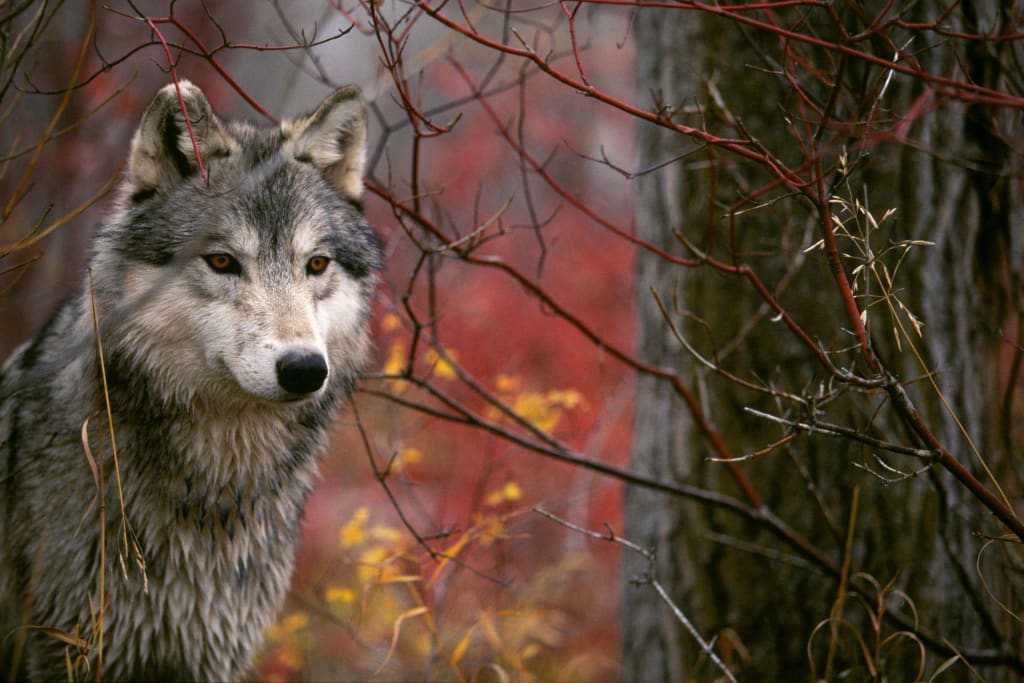
The mournful howl rang through the moonlit valley and stopped abruptly. A slender young woman stood still with a backpack on her back, unable to hear any movement, so she put her hands up over her mouth and howled again. This time. She heard the echoing cries and the noisy frolic of the little wolf drifting closer.
The three little wolves jumped into the open like light smoke, looked curiously at the stranger in front of them, and jumped back into the shadows of the trees.
Luo Shanbing was so happy that she let out a "ha" sound. These "troublemakers" had spent another year safely.
She was crossing the Besgiz Mountains in southern Poland when she found three more wolf packs, all with pups, showing their ability to survive.
Luo Shanbing, a 43-year-old researcher, has worked to prove that humans can coexist peacefully with carnivorous beasts, and with good results. "Wolves eat meat, and they are huge and may be scary, but they are not as dangerous as everyone thinks," she said. "They are beautiful and good for forest ecology, and as long as they are given space, they can survive even in densely populated Europe."
Wolves used to be all over Europe, but by the 1970s, wolves were almost wiped out everywhere except the Soviet Union and Romania. Today, they migrate everywhere. Wolves are reappearing in France, Germany, Sweden and Norway, and several wolves were spotted in Switzerland a few years ago. Experts speculate that sooner or later wolves will set foot in Belgium, the Netherlands or Denmark.
Most countries now have legislation to protect wolves, but controversy persists.
A big male wolf weighs about 80 kilograms and can kill a horse. Farmers and shepherds hate wolves. Poland is at the forefront of the "wolf war" in Europe, and wolves migrating westward pass through the big forests within the country, to Germany and beyond. But the wolves of Poland are on the verge of extinction. Fortunately, Luo Shanbing, who is brave and brave, stood up for them.
Luo Shanbing has a pair of hazel eyes. She lives with her parents and sisters in Katowice, an industrial city in southern Poland. She often goes hiking and camping in the moss-covered virgin forest, and gradually falls in love with the forest. She later devoted herself to the forest protection movement. In the virgin forest of Biawo Junza, she was very moved to find that there are four or five groups of wolves that have contributed to the protection of the healthy development of the forest. She told her colleagues: "Wolves are natural forest managers. Deer can destroy forests, but because its natural enemies are about to become extinct, they are now constantly multiplying. We must stop hunting wolves so that we can control the number of deer, and the forest will benefit from it."
Convincing hunters and officials is not easy. Most foresters are hunters too. Luo Shanbing tracked wolves, analyzed wolf droppings and leftover food, and found that they only preyed on young, old or sick animals and did not attack the able-bodied. "A pack of wolves preys on three red deer a week, and there is plenty of evidence that wolves keep deer populations balanced and in good and healthy condition," she said. "Wolves eat leftover animal carcasses that can be feasted on by birds, mammals and insects, so forests with wolves are also home to large numbers of small animals."
In 1996, Luo Shanbing, colleagues and some supporters established the "Wild Wolf Association", dedicated to finding ways for wolves to coexist peacefully with people. Luo Shanbing imitated the wolf howl for the first time, and Wan Luopeng laughed at it, and then he heard the howl in response, and he couldn't laugh. She was able to communicate with the wolves. Now, people from all over Europe come to sit with her in the forest all night, listening to her howl from different locations, waiting for the wolves to respond. In this way, she can count the wolf pack in an entire valley overnight.
In the winter, she follows wolves through the snow, walking almost 20 kilometers a day. Impressions of Wolves Big Claw Book to read: She sees "newlyweds" having fun, pushing significant others down the snow, and she occasionally spots wolves on the footprints she left a few minutes ago, thinking: "So they're following me too!"
But she doesn't panic. Wolves, although predators, don't attack people; only rabies-infected wolves are really dangerous. According to records, only four people have been killed by rabies-free wolves in Europe in the past 50 years.
Most wolves hide far away. Luo Shanbing only rarely meets them when she howls. She said: "Once, a wild wolf suddenly appeared a few meters away, how beautiful and majestic, but unfortunately it was fleeting, and there was no time to take a picture. Even if we can't see the wolves, we know where they are hiding and what they are doing, and that's the most important thing."
In 1997, Poland still allowed wolf hunting, and about 30 were killed each year. Luo Shanbing then lobbied the Polish environment minister, wildlife experts and the press.
She told everyone: "It costs more than 20 million euros a year to set up a fence to protect the deer, and the wolves can serve us for free."
After her speech, she answered questions and stood for three hours. "This is the longest speech I've ever been through," the environment minister told her with a smile. A MP also told her: "You correct a lot of people's misconceptions about wolves."
Soon, Poland banned wolf hunting.
But practical problems followed. One day, the doorbell of Luo Shanbing's house rang in the sky. When he opened the door, it was Wu Facheng, a neighbor. He cried: "I suffered a heavy loss! Your wolves killed 23 of my sheep. What do you think should be done?"
Luo Shanbing helped bury the sheep's body, then applied to the district court for compensation of 46 euros per head, and promised: "Don't worry, the wild wolf will never violate your sheep again in the future."
A few days later, she gave Wu Facheng a fluffy white puppy. This kind of dog has been bred in the Tatra Mountains for hundreds of years to prevent wolves and protect farm animals, and is now kept as a pet. The puppy soon grew taller than the wolf, and accompanied the sheep day and night, barking wildly when he saw a wolf approaching.
She knew that hunters used to use strings of red flags to surround and guide wolves to their guns. Strangely, wolves just didn't dare to cross the line drawn by the red flags. She recruited local women to weave and dye a lot of red flags. Now at night, Wu Facheng closes the sheep and ties the red flags in circles. He said, "Wolves don't come to trouble anymore."
Other farmers have embraced Luo Shanbing's dog and red flag, and have achieved remarkable results. "We used to burn tires and set off firecrackers to chase wolves, but we always lost a few sheep every year," said Mai Xiantian, a shepherd. "Now we have three dogs to guard, and we have no worries."
On a winter day last year, Luo Shanbing stepped on a forest road and saw the footprints of wolves in the place where they had not seen wolves for many years. It was a group of wolves "breaking up", and the younger ones were opening up new territory. She said: "This is the epitome of many parts of Europe. It's amazing to see these'bad boys' appear in the forest again."
Not everyone feels the same way. A French parliamentary committee advocated in May 2003 that wolf hunting should be allowed in certain designated areas to protect livestock. Spain still allows wolf hunting. Although the total number of wolves in Norway last year was less than 30, the government issued a wolf hunting order to protect farmers. Most European farmers complain. If livestock are killed by wolves, the compensation is too low. Luo Shanbing said: "Farmers may wish to take measures to prevent wolves that have been practiced for hundreds of years. It is very effective. Wolves can cause harassment, but we should learn to share the forest with them."
Polish forest officials are now backing her, with Chalis, deputy director of the Forest Service, saying: "Rosanice is convincing. For a long time, nature was out of balance and wolves became a rare species. Now that wolves are back, we are watching how farmers accept them."
"Thank you Luo Shanbing, the wolf is back, this is our gift to Europe."
About the Creator
Kiana
Like interesting stories, like interesting life.






Comments
There are no comments for this story
Be the first to respond and start the conversation.